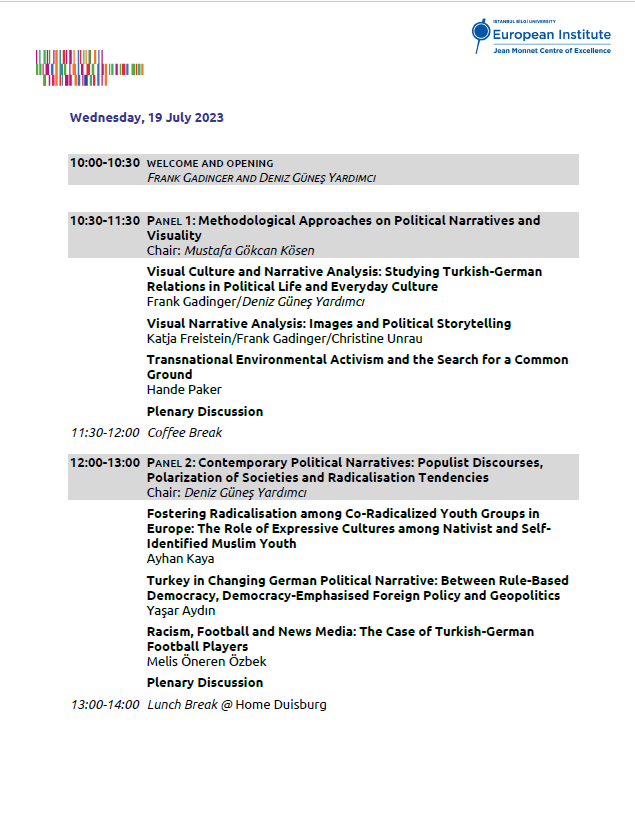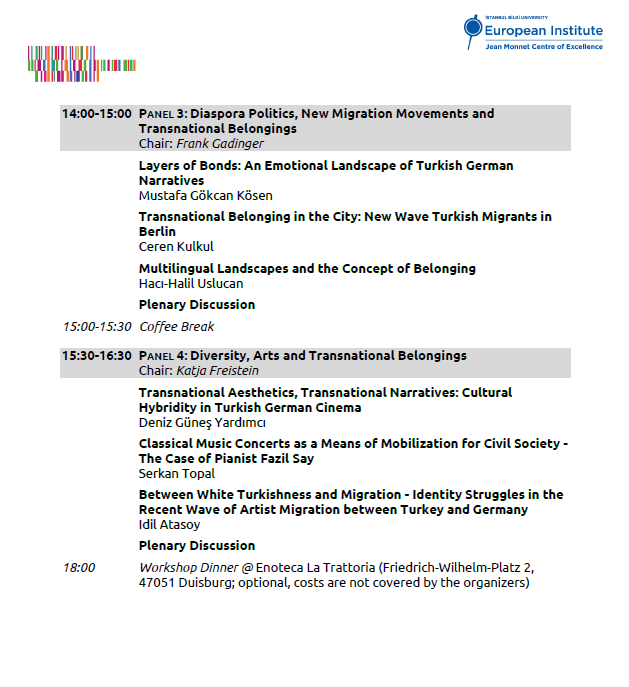The Power of Narratives and Visual Culture in Transnational Cooperation:
Exploring Turkish-German Relations in Political Life and Everyday Culture
Authors’ Workshop
Venue: Horst-Schimanski-Saal, KHK/GCR21 | Schifferstraße 44, 47059 Duisburg
19 July 2023
Preliminary Programme
Please note: All times indicated in the programme are CEST.
Rationale and background of the workshop
The idea for this authors’ workshop is based on a joint research project between the European Institute at Istanbul Bilgi University and the Centre for Global Cooperation Research, funded by the German Academic Exchange Service (DAAD) and TÜBITAK. The group of scholars (Katja Freistein, Frank Gadinger, Deniz Güneş Yardımcı, Mustafa Gökcan Kosen, Christine Unrau) share an research interest in developing conceptual and methodological ideas on visual culture, narrative analysis and emotions in world politics. The empirical focus of the project is the relationship between Turkey and Germany from a transnational perspective.
The starting observation is that the relationship between Turkey and German has been mainly analyzed in social science research (e.g. foreign policy analysis) through a narrow focus on political elites and in the context of the EU or broader geopolitical concerns. These studies often claim that the relationship has transformed from a befriended to a rather pragmatic mode of cooperation and can be characterized as a form of “distant neighbors” (the original title of the research proposal), particular in the ritualized meetings between German and Turkish political leaders (Merkel, Scholz, Erdoğan). Our project aims at challenging or at least supplementing this dominant narrative by broadening the empirical scope from political elites to the much larger variety of political and cultural actors (civil society movements, political activists, scientists, filmmakers, novelists, musicians, artists etc.) from both countries in their European and transnational context.
Our main argument is that these actors, operating in often very loose transnational networks (e.g. environmental activism, film festivals), have developed and established practices and creative techniques in transnational cooperation and thereby overcome the nationalist-driven narratives of a distant relationship. In short, the state of affairs in German-Turkish relations is much more complex and, to some extent, much more promising than a focus on bilateral official relations would suggest.
The project follows the conceptual idea that narratives and visual culture play a significant role in building group identities, (de-)legitimizing narrow political realities and regaining voice in political discourses. The contributors of the workshop are encouraged to show in various empirical examples that political and cultural actors around the Turkish-German relationship have developed transnational and culturally hybrid identities and work with narratives and visual culture to stabilize these fragile relations and communities across borders. Like populists, these actors develop (visual) narratives and draw on (pop-)cultural repertoires to create resonance with their critical audience. Particularly in situations of crisis or exception, such as the recent, devastating earthquake in Turkey or the respective elections, transnational ties within civil society become more visible and can be studied systematically as instances of solidarity or cooperation.
To this end, the workshop brings together scholars from various disciplines – political science, sociology, and cultural studies – for an exchange based on the participants' work in progress around various conceptual approaches and empirical cases. The aim of this workshop is to foster an interdisciplinary conversation on the role of narratives and visual culture in cases of transnational cooperation in the everyday. In order to prepare for the authors' workshop, participants are expected to present an idea of a potential book chapter and send a short paper (2-3 pages) to the organizers of the work before the workshop. They are invited to give a short input of approximately ten minutes on this first idea. Participants are encouraged to talk about conceptual and methodological challenges and problems in their work and to discuss these issues in an open conversation and informal working atmosphere.
The results of the authors’ workshop will be published in an edited volume (potentially in the Routledge Global Cooperation Series)


List of Participants
Ayhan KAYA
Istanbul Bilgi University
Ceren KULKUL
Koç University, Istanbul
Christine UNRAU
Käte Hamburger Kolleg/Centre for Global Cooperation Research,
University of Duisburg-Essen
Deniz Günes YARDIMCI
Istanbul Bilgi University
Frank GADINGER
Käte Hamburger Kolleg/Centre for Global Cooperation Research,
University of Duisburg-Essen
Haci-Halil USLUCAN
University of Duisburg-Essen
Hande Paker
Käte Hamburger Kolleg/Centre for Global Cooperation Research, University
of Duisburg-Essen
Idil ATASOY
The School for Advanced Studies in the Social Sciences (EHESS),
Paris/Marseille
Katja FREISTEIN
Käte Hamburger Kolleg/Centre for Global Cooperation Research,
University of Duisburg-Essen
Melis ÖNEREN ÖZBEK
Bahçeşehir University, Istanbul
Mustafa Gökcan KÖSEN
Istanbul Bilgi University
Serkan TOPAL
Käte Hamburger Kolleg/Centre for Global Cooperation Research,
University of Duisburg-Essen
Yaşar AYDIN
CATS – Centre for Applied Turkey Studies at SWP – German Institute for
International and Security Affairs, Berlin

